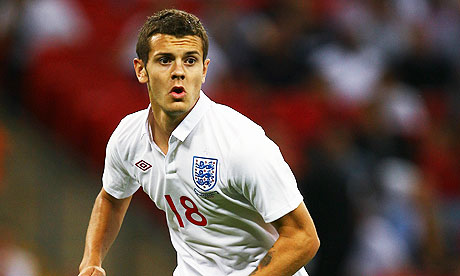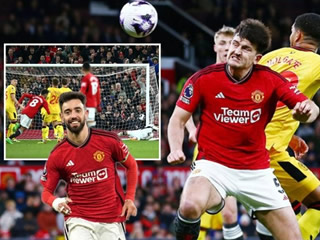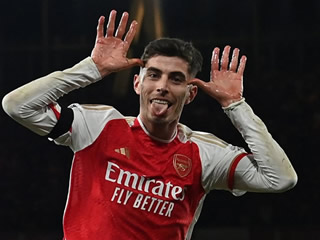Jack Wilshere's demotion shows Fabio Capello lacks stomach for revolution
Posted Sunday, August 29, 2010 by theguardian.com

Jack Wilshere made his full England debut against Hungary, but has been dropped to the Under-21s.
Watching the 18-year-old Jack Wilshere order Andrey Arshavin and Abou Diaby about in a recent Arsenal game brought a sweet sense of revelation. Nothing in sport quite beats the thrill of knowing part of the future is running around in front of you.
There was the long, flat, diagonal ball to Theo Walcott to set up a goalscoring chance, the nutmegging of an opponent out wide and the ceaseless roving in search of links to make. Then there was the bandy, rolling gait of a jump jockey crossed with a welterweight. In those moments, you feel hype transformed into something more real: the sure sense that this is what you watch football for – the enterprise, the ingenuity.
For the English, the contemplation of such instinctive talent is complicated, because we grew up in a culture that is suspicious of creativity on a football field, just as it is of intellectuals in wider spheres. Despite Paul Gascoigne, and regardless of Paul Scholes, a low hum of suspicion (certainly below the Premier League) dictates that artistic footballers are a luxury. They are only Matt Le Tissier in assorted forms.
Many of us yearn to take a flame-thrower to this self-limiting prejudice. In Wilshere's case we don't have to, at club level anyway, because his place of work is the Arsenal salon, where Arsène Wenger will promote his highest virtues. This is the same Jack-the-lad Wilshere, though, who was sent back to the England Under-21s this week by Fabio Capello as he sifted his squad for the Euro 2010 qualifiers against Bulgaria and Switzerland.
Wilshere's demotion from the team who beat Hungary in a friendly two and a half weeks ago was a longstanding intention. But no one should mistake planning for wisdom.
More than at any time since 1966, one could sensibly argue, England are at a moment when they have to decide who they want to be, which strengths they will cultivate, how fast (if ever) they will join the global mainstream of skill and possession-based football. It follows incontrovertibly that England cannot edge closer to the German or Spanish models by relying on players who have crashed and burned in four international tournaments since 2002, and exhibit a profound fatalism of the sort defined by the former England cricket coach Duncan Fletcher as "here we go again" syndrome.
About the only argument for not unleashing a wave of youth on England's Euro 2012 qualifying campaign is that pessimism and negativity will infect another generation, certainly while Capello is still in charge. There is a case for fitting Wilshere, Adam Johnson and Joe Hart with the kind of ear-muffs used by lumberjacks and road-diggers so that playing for England can remain the stuff of dreams and not just an ordeal to be endured between Premier and Champions League assignments.
The latest flirtation with Scholes cannot be questioned if you start out with the sensible belief that the best English midfielder of the past 20 years really ought to be wearing his nation's strip, yet there is still no evidence that Capello understands his duty to construct a tournament-credible team for Poland and Ukraine two years from now, by which time Scholes will be 37. Maybe he doubts he will still be around by then and is protecting his market value to Manchester City and the big Italian clubs.
Either way, Wilshere's relegation from seniors to Under-21s was a gross denial of England's need to change in talent, style and spirit.
As a fierce advocate of maturity – think Serie A, with its cast of ageing aristocrats – Capello looked at the flower of English youth before the World Cup and thought it feeble, which is why he took the all-time oldest squad to Rustenburg. This mistrust, which still sours the air, has been rendered ludicrous by the early-season zest of Walcott and Johnson, both left behind.
Hart's overdue promotion to the No1 goalkeeping spot corrects another error. The faith placed in Kieran Gibbs as second-choice left-back also denotes a move in the right direction. But the coolness shown to Wilshere, Everton's Jack Rodwell and Tom Huddlestone of Spurs suggests Capello lacks the stomach for revolution and plans instead a gradualist approach that will leave many of the worst elements still in place and set the newcomers up to fail alongside their peers.
On the floor of their soul, England have this chance to change not only the odd name, but the culture and the ethos. This was never likely to be the contribution of a weakened manager who appears seriously discombobulated by his experience in South Africa.
Wilshere made his Premier League debut at 16 years and 256 days, and his England bow when 18 years and 222 days had passed. He's ready to play in qualifiers, ready to raise the tone. But courage fails.
Webb reveals Fifa's lack of foresight
Howard Webb's admission that he ought to have dismissed Holland's Nigel de Jong in the World Cup final for the kind of flying leap pioneered by Bruce Lee was less shocking than his revelation that Fifa officials said nothing before the match about the potential for violence. Had they not watched the Dutch midfielder Mark van Bommel, or did they assume he was a stray agricultural implement that was now back in its shed?
"On the day of the final we had briefings from Fifa technical staff, and I don't think anyone foresaw the game being the physical encounter it turned out to be," Webb said last week. "We talked about the emotion, the styles of play, but no one said anything about it being so physical." Which is odd, given that Holland had embraced a Clockwork Orange ethic to rid themselves of decades of underachievement.
Presumably Fifa thought the Dutch, for whom Van Bommel was an unchecked crime wave, would suddenly abandon the rough stuff and try to out-pass the international game's best passing side. Webb might have worked this out for himself. And the high priests of refereeing are advised to think less about "the emotion" and more of the reality.
Photos
More»Meet Jude Bellingham's stunning girlfriend Laura
Thursday April 25 2024[PICTURE SPECIAL] Man Utd 4 - 2 Sheffield United
Thursday April 25 2024[PICTURE SPECIAL] Arsenal 5-0 Chelsea
Wednesday April 24 2024



Your Say